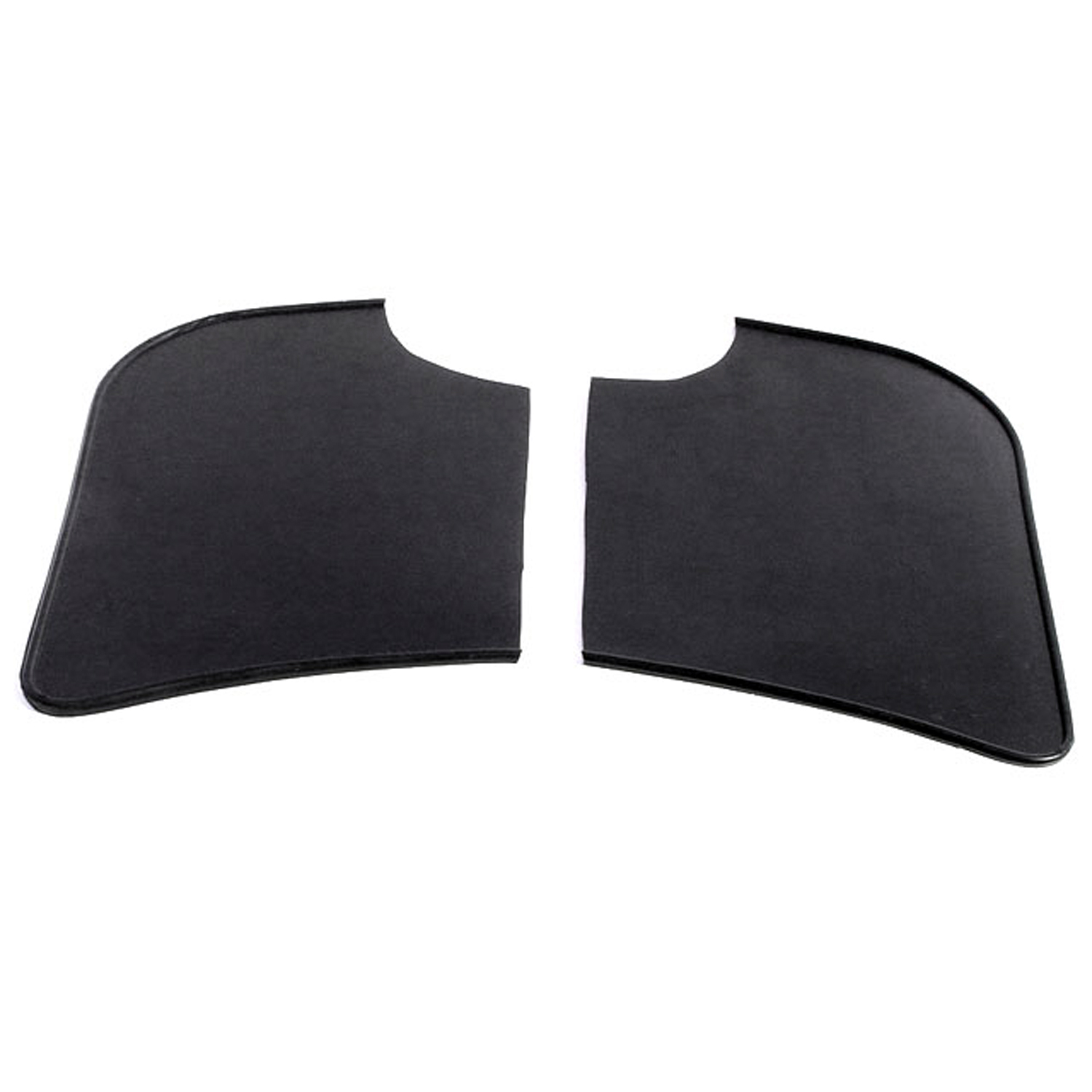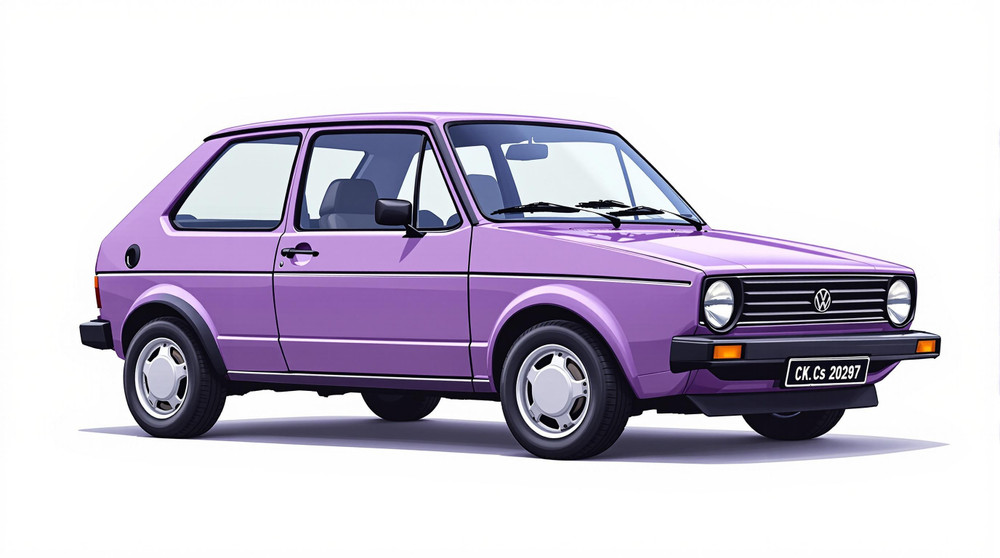Image of 1979 Volkswagen Rabbit, Note: These illustrations use artistic license and may differ from actual historical models.
Performance Metrics
Fundamental Metrics
Emotional Appeal
MMP Rating
| Engine Specifications | |
|---|---|
| Engine Options: | 1.5L I4, 1.6L I4 Diesel |
| Displacement Range: | 1.5-1.6L |
| Horsepower Range: | 48-70 hp |
| Torque: | 56-77 lb-ft |
| Compression Ratio: | 8.2:1 (1.5L I4), 23.0:1 (1.6L I4 Diesel) |
| Ignition System: | Distributor ignition |
| Cooling System: | Water-cooled |
| Performance Specifications | |
| 0-60 Time: | 14-16 seconds |
| 1/4 Mile Time: | 19-21 seconds |
| Top Speed: | 90-100 mph |
| Transmission and Drive | |
| Drive Type: | FWD |
| Transmission Type: | 4-speed manual, 3-speed automatic |
| Fuel and Efficiency | |
| Fuel System Type: | Carburetor (1.5L I4), Direct Injection (1.6L I4 Diesel) |
| MPG: | 25-30 mpg |
| Dimensions and Brakes | |
| Brakes: | Front disc, rear drum |
| Wheelbase: | 94.5 inches |
| Weight: | 1,800-2,000 lbs |
Note: Specifications for classic cars are given to the best of our ability, considering the limited and variant data available.
1979 Volkswagen Rabbit: A Hatchback That Hopped into History
The 1979 Volkswagen Rabbit leapt onto the automotive scene as a sprightly contender in the burgeoning compact car market. Born from the German automaker Volkswagen, this hatchback was the North American counterpart to the world-renowned VW Golf. It arrived at a time when fuel efficiency and economy were becoming paramount due to the oil crises of the 1970s. A unique fact that car enthusiasts might find intriguing is that the Rabbit was actually manufactured in Pennsylvania, making it one of the first European cars to be produced on American soil.
Design and Innovation
The Rabbit's exterior styling was a breath of fresh air, with its angular lines and friendly front fascia that gave it an approachable yet modern appearance. Inside, occupants were greeted with a functional and straightforward cabin, where the quality of materials balanced durability with cost-effectiveness. For its era, the Rabbit was quite innovative, offering features like front-wheel drive and a transversely mounted engine, which were not yet common among American cars.
Color options for the Rabbit ranged from vibrant hues to more subdued tones, with Mars Red and Diamond Silver being among the popular choices. The vehicle came in various body styles including two-door and four-door hatchbacks, with a convertible version known as the Cabriolet joining later. The most iconic was arguably the two-door hatchback, which epitomized the compact and efficient ethos of the model.
Historical Significance
The 1979 Volkswagen Rabbit made an indelible mark on automotive design by popularizing the front-wheel-drive layout in compact cars, which improved space efficiency and fuel economy. It stood out from its contemporaries by offering European engineering at an affordable price point, influencing a generation of automakers to prioritize these aspects in their own designs.
Performance and Handling
Underneath its unassuming exterior, the Rabbit delivered respectable performance for its class. Equipped with a 1.6-liter four-cylinder engine, it could reach modest top speeds and achieve 0-60 mph in a leisurely but practical timeframe. Handling was nimble thanks to its lightweight construction and well-tuned suspension, which allowed it to tackle both city streets and country roads with ease. Drivers often praised the direct steering feedback and the engine's distinctive hum that provided an engaging driving experience.
Ownership Experience
The 1979 Volkswagen Rabbit served many roles ranging from a reliable daily driver to a weekend show car. Some enthusiasts even took their Rabbits onto the racetrack. Maintenance was generally straightforward, making it a favorite among DIY mechanics. Its reliability was commendable for its time, though some parts may now be harder to come by due to its age.
Fun Facts
A fun tidbit about this model is that there were sportier versions like the GTI introduced in Europe that eventually made their way stateside due to popular demand. While not necessarily known for breaking speed records, it did set sales records for Volkswagen in North America. Despite facing criticism over time for its modest powertrain or rust issues (common in many vehicles of that era), it maintained a loyal following.
Collector's Information
Today, values for a well-preserved 1979 Volkswagen Rabbit can vary widely based on condition, mileage, and originality. While production numbers were substantial given its popularity, finding one in pristine condition can be challenging. As for price trends, well-maintained Rabbits have seen a gradual appreciation among classic car enthusiasts who value its historical significance and charm.
Conclusion
The 1979 Volkswagen Rabbit stands as an emblematic figure in automotive history—a testament to simplicity and efficiency wrapped up in an endearing package. Its legacy continues to hop along within the classic car community as both a beloved collector's item and a nostalgic nod to an era when small was big.
1979 Volkswagen Rabbit Catalog of Parts
 1979 Volkswagen Rabbit Gravel Shields. Molded flat without metal backing plates-FS 40Gravel Shields. Molded flat without metal backing plates. Apply with contact cement. 7-5/8" long X 5-5/8" wide at top. Pair
1979 Volkswagen Rabbit Gravel Shields. Molded flat without metal backing plates-FS 40Gravel Shields. Molded flat without metal backing plates. Apply with contact cement. 7-5/8" long X 5-5/8" wide at top. PairWhy Choose Metro?
For over 100 years, Metro Moulded Parts has been the pinnacle of quality in classic car restoration parts. Our commitment to precision and authenticity in every component ensures a perfect fit and an OEM-level appearance.
- Expert Craftsmanship & Quality: Each part is a testament to our dedication to reliability and perfection, crafted from original designs and thoroughly tested.
- Advanced Technology: We use cutting-edge techniques to create flawless, long-lasting parts that surpass others in performance.
- SuperSoft Sponge – The Ultimate Door Seal: Not only are our door seals 30% softer than competitors', but they're also guaranteed to never leak. They effectively reduce wind and road noise, enhancing your classic car's comfort and driving experience.
- Proudly American: Our parts are a product of American craftsmanship, made in the USA with a spirit of excellence and heritage.
- Unrivaled Warranty: We back our products with a 30-year industry-leading warranty, a testament to our confidence in their quality.
Join us in preserving the legacy of classic cars with parts that are crafted for perfection, not just made.

